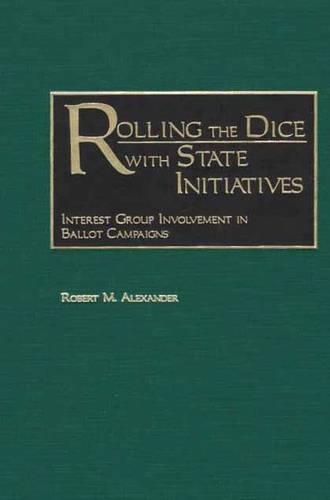
Rolling the Dice with State Initiatives: Interest Group Involvement in Ballot Campaigns
(Hardback)
Publishing Details
Rolling the Dice with State Initiatives: Interest Group Involvement in Ballot Campaigns
By (Author) Robert M. Alexander
Bloomsbury Publishing PLC
Praeger Publishers Inc
30th December 2001
United States
Classifications
Tertiary Education
Non Fiction
Pressure groups, protest movements and non-violent action
322.43
Physical Properties
Hardback
144
Description
Alexander examines interest group involvement in direct democracy. The tools of direct democracy--initiative, referendum, and recall--were initially created to delimit the power of economic interest groups and curb the power of political machines. Today, however, many believe that direct democracy has become a tool dominated by economic interests and that ballot contests have emboldened moneyed interests, rather than stemming their power. This unanticipated consequence of direct democracy has been coined the Populist Paradox. Through two case studies, Alexander examines how debilitating the Populist Paradox truly is. The issue of gambling was selected due to the large number of affected interests and the degree of conflict enveloping the issue. Current research suggests that economic interest groups are best able to mobilize monetary resoures, while citizen groups are best able to mobilize personnel resources. The question then turns to whether the differential ability to mobilize resources translates to success or failure for groups with different bases of support. Populist and Progressive reformers obviously did not foresee the advent of campaign consultants, focus groups, direct mail, and paid petitioners. These changes in political campaigning have made the ability to mobilize personnel resources much less important. Alexander provides a valuable extension to current knowledge of group involvement in ballot campaigns that will be of particular interest to scholars, students, and other researchers involved with state and local public policy.
Reviews
This short study deserves to occupy a place in the literature on interest group theory....this is an excellent reference on modern Native American politics. Recommended for upper-division undergraduates and above.-Choice
"This short study deserves to occupy a place in the literature on interest group theory....this is an excellent reference on modern Native American politics. Recommended for upper-division undergraduates and above."-Choice
Author Bio
ROBERT M. ALEXANDER is Assistant Professor of Political Science at Frostburg State University. He previously taught at Bowling Green State University. His research examines interest groups and state and political politics he has published in the Journal of Politics and the Arkansas Review.
